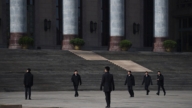【新唐人2013年03月27日讯】中共与俄罗斯签署两份重大军售框架协议,中共将购买24架俄罗斯苏-35战机(SU-35)和四艘拉达级AIP潜艇。而有关协议在习近平访问俄罗斯前已签署。据了解,这是时隔近10年后,中共首度向俄罗斯采购重大军事技术装备。是什么原因导致这场军售呢?下面我们一起来看看专家的分析。
据中共喉舌《央视》新闻《今日关注》报导说,俄罗斯向中国出售的拉达级AIP潜艇静音能力十分突出,这4艘潜艇其中两艘将在俄罗斯建造,另外两艘在中国建造﹔而中国向俄罗斯采购的新型苏-35战机,被认为是最接近五代机的四代机。在中国隐形战机服役前,苏-35可有效减轻中国的空防压力。
预计在未来,中、俄两国还将达成更多新的军事技术合作合同,如S-400远程防空导弹,117S大推力发动机、伊尔-476大型运输机和伊尔-78空中加油机等。
那么,是什么原因促成这场十年未见的军购呢?
美国中文杂志《中国事务》总编辑伍凡认为,有两个因素,一个是,俄罗斯为了做生意,一个是,为加强和习近平新上来的这批人的关系。
《中国事务》总编辑伍凡:“习近平要走的是共产主义道路,蒲亭要走苏联的道路,所以这两个在政治上,比较接近,军事上可以做一些合作,它开放国防部指挥中心让习近平去看,也就是想拉拢这个习近平。所以中国和俄国现在的军事关系,比过去略微近了一点。”
而俄罗斯《生意人报》(Kommersant)3月初报导这则消息时,转述俄罗斯《武器出口》杂志主编安德烈‧弗罗洛夫的论述,他说,中共之所以大量进口苏-35战机,可能与中共国防工业系统的技术瓶颈有关。中共研制和生产的国产第4代和第5代歼击机,恐怕遇到困难。
时事评论家文昭则认为,中、俄签定军购大单的下一步,就是双边贸易额的增长,双方在经济上的联系因此加强。还有一点,就是加强了政治上的协调。
时事评论家文昭:“这个军购合同的政治意义比较大,就是说它是为所谓的中国战略协作伙伴关系,开了一个头彩,本身把先进武器出售给中国,出售给中共政权,这是俄罗斯对所谓的,战略伙伴关系,相当于表达了一份心意,对中共来讲,也是送上一笔采购订单、送上一份礼。”
此外,文昭指出,中共最想从俄罗斯取得的军事技术,不是硬体的装备,而是技术转移。如果从飞机的角度来讲,就是飞机的发动机技术和雷达技术。文昭认为,从俄罗斯本身来说,军工部门可能不赞成军购。
文昭:“(中共)想取得技术转移为最终目地,这个意图一直是很明显的,所以比较先进武器的军售,在俄罗斯国内一直有抵制,这也是为什么过去这么多年以来,大的军事采购,俄罗斯一直没有给中国,但是,这次它(中共)打开了,就是说,最近十年,它(俄罗斯)又再次出售先进武器,那这本身就是一种政治上的表态。”
文昭表示,中共会进行所谓的反向研究,也就是“山寨”的复制技术。所以,军购这个问题比较敏感,俄罗斯出售武器给中共,将造成俄罗斯军工产业的知识产权流逝。
2008年,俄罗斯推出的苏-35战机,是最先进的战斗机机型之一,这种机型的战斗机,与中共曾大批采购最后自行“克隆”的苏-27(歼11),设计上有许多相似之处。
伍凡指出,俄国人一直防着中国,中俄关系并不是人们所讲的那样,是铁哥们或者军事战略同盟。伍凡强调,俄国最终还是会留一手,不会把最好的武器卖给中国。
此外,伍凡说,中、俄巨额的军售项目,目前还只是框架协议,未来很有可能出现变数。
采访编辑/常春 后制/薛莉
Analysis: China-Russia Arms-Sale Agreement
The Chinese regime and Russia have signed
two important arms-sale contracts.
China is buying 24 of the Sukhoi Su-35 fighter planes
and four Lada-class AIP submarines from Moscow.
Chinese state media says the deals were signed
before Xi Jinping visited Russia.
Sources say it’s the first time in nearly a decade that China
bought large military technological equipment from Russia.
So what caused the arms sale?
Let’s take a look at some expert analyses.
The Chinese Communist Party(CCP)’s central television
reported that the Lada-class AIP submarine’s silencer ability
is very prominent—two submarines are to be built in Russia
and the other two in China.
The Su-35 plane is a 4th generation fighter;
classified as being closest to the 5th generation.
Reports say Su-35 can effectively reduce the pressure
on China’s air defense before it’s stealth fighters come online.
It predicted that China and Russia will sign more
new military technical cooperation contracts;
e.g. the S-400 air defense missile, the Saturn 117S engine,
the IL-476 aircraft carrier and the IL-78 air refueling tankers.
So, what’s the reason for the CCP’s purchasing of weapons
from Russia after a decade?
Wu Fan, Chief Editor of US-based China Affairs magazine
makes some comments.
Wu gives two factors—firstly, Russia wants the business,
and secondly, Russia wants to strengthen its relationship
with Xi Jinping’s new leadership.
[Wu Fan]: “Xi Jinping wants to follow the road of
communism, and Putin wants to go the Soviet Union’s way.
These two ways are close politically,
and in the military area, they can cooperate.
Putin opened the defense center for Xi’s visit
in order to win Xi over.
Thus, now both countries’ military relations
are slightly closer than that in the past.”
Russia’s Kommersant newspaper reported in early March—
citing editor-in-chief Andrei Frolov of Russia’s Arms Exports
magazine—that the reason the CCP bought the large Su-35
fighters may be related to China’s defense industry crisis.
The 4th and 5th generation fighter that China is trying
to develop, may have faced difficulties.
Wen Zhao, a current affairs commentator, believes that
after China and Russia’s signing of contracts,
the next move will be to increase their bilateral trade volume,
strengthening economic relations and the political coordination for both.
[Wen Zhao]: “The purchase deals
have big political meanings;
they serve as part of China’s so-called strategic partners’
relationship —it’s a bonus for the first move.
Putin sold advanced weapons to China’s communist regime
—it’s equivalent to Russia sending a gift to a strategic partner and as for the CCP,
they will be sending large trade orders as their gift to Russia.”
Wen says the CCP’s first wish is to get technological military
knowledge from Russia, but not the hardware equipment,
and to transfer Russia’s technology—e.g. for aviation,
they need the plane’s engine and radar technologies.
Wen believes that Russia’s military-industry sectors
may not agree the arms-sale.
Wen Zhao: “To transfer Russia’s technology is China’s
ultimate goal, and this intention is very obvious.
Russia has always rejected the sale of advanced weapons;
for over a decade, Russia has not sold heavy arms to China.
Yet, this time the door has been opened and Russia has sold
advanced weapons to China, indicating its political stance.”
Wen says the CCP will be studying the bought technological
knowledge, and creating “counterfeit” copy technology.
Thus, weapon sales is a sensitive topic; Russia’s sale to China
will cause its military-industry a loss in weapon intelligence.
In 2008, Russia launched its Su-35 fighters,
as one of the most advanced fighter models.
And the CCP purchased and cloned Russia’s Su-27,
creating the F-11, with its many similar designs.
Wu Fan says Russia has been cautious, and the Sino-China
relationship is not one of “strategic partners” as some say.
Wu emphasizes that Russia will certainly hold back,
and will not sell its best weapons to China.
The huge arms sales is only a framework agreement
and may change in the future.

























